Moderate Alcohol Consumption Linked to Reduced Cardiovascular Risk
- Normal Liver Cells Found to Promote Cancer Metastasis to the Liver
- Nearly 80% Complete Remission: Breakthrough in ADC Anti-Tumor Treatment
- Vaccination Against Common Diseases May Prevent Dementia!
- New Alzheimer’s Disease (AD) Diagnosis and Staging Criteria
- Breakthrough in Alzheimer’s Disease: New Nasal Spray Halts Cognitive Decline by Targeting Toxic Protein
- Can the Tap Water at the Paris Olympics be Drunk Directly?
- Should China be held legally responsible for the US’s $18 trillion COVID losses?
- CT Radiation Exposure Linked to Blood Cancer in Children and Adolescents
- FDA has mandated a top-level black box warning for all marketed CAR-T therapies
- Can people with high blood pressure eat peanuts?
- What is the difference between dopamine and dobutamine?
- How long can the patient live after heart stent surgery?
Harvard Researchers Find Moderate Alcohol Consumption Linked to Reduced Cardiovascular Risk.
It is well-known that alcohol consumption is a leading global cause of death and disability, associated with cardiovascular diseases, metabolic disorders, and even certain cancers.
However, a recent study published in the Journal of the American College of Cardiology by researchers from Massachusetts General Hospital and Harvard Medical School sheds new light on the relationship between moderate alcohol consumption and cardiovascular risk.
The study titled “Reduced Stress-Related Neural Network Activity Mediates the Effect of Alcohol on Cardiovascular Risk” suggests that moderate alcohol consumption is linked to a long-term reduction in stress signals in the brain, thereby lowering the risk of heart attacks and strokes.
This influence on the brain’s stress system may be a contributing factor to the reduced cardiovascular events observed in moderate alcohol drinkers.
Nevertheless, the researchers emphasize that using alcohol to lower the risk of heart attacks or strokes is not recommended, as any amount of alcohol increases the risk of cancer.
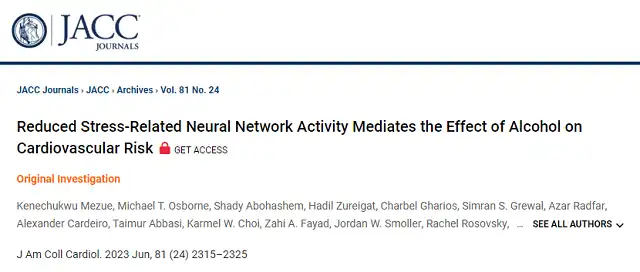
Earlier epidemiological studies indicated a correlation between light to moderate alcohol consumption and lower cardiovascular disease risk. Light to moderate drinking is defined as one drink per day for women (equivalent to 14 grams of ethanol) and one to two drinks per day for men, but the underlying mechanisms influencing cardiovascular disease risk remained unclear.
In this study, researchers analyzed data from 53,064 participants in the Mass General Brigham Biobank who completed health behavior surveys. The participants had an average age of 60 and were categorized into three groups based on alcohol consumption: light (less than one drink per week), light-to-moderate (one to 14 drinks per week), and heavy (more than 14 drinks per week).
After adjusting for various confounding factors, the researchers assessed the relationship between light-to-moderate alcohol consumption and major adverse cardiovascular events.
In total, 23,920 were light drinkers, 27,053 were light-to-moderate drinkers, and 2,091 were heavy drinkers. Over an average follow-up period of 3.4 years, 1,914 individuals experienced major adverse cardiovascular events.
The study found a U-shaped relationship between alcohol consumption and major adverse cardiovascular events. Even after adjusting for cardiovascular risk factors, light-to-moderate alcohol consumption was associated with a 22% reduction in the risk of major adverse cardiovascular events compared to non-drinking or light drinking.
Importantly, the study also revealed an increased risk of cancer associated with light-to-moderate alcohol consumption.
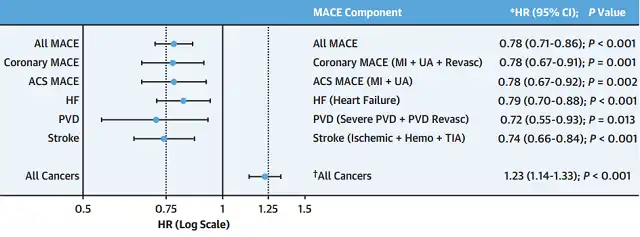
Light-moderate drinking reduces risk of major adverse cardiovascular events
Next, the researchers analyzed 754 participants who underwent PET/CT brain imaging to examine the impact of light-to-moderate alcohol consumption on brain network activity.
Brain imaging data showed a U-shaped relationship between alcohol consumption and stress signals. Compared to non-drinkers or light drinkers, light-to-moderate drinkers exhibited reduced stress signals in the amygdala, a brain region associated with stress responses. Heavy drinking did not decrease stress signals.
The researchers further analyzed the cardiovascular event history of these participants and found that light-to-moderate drinkers had fewer heart attacks and strokes.
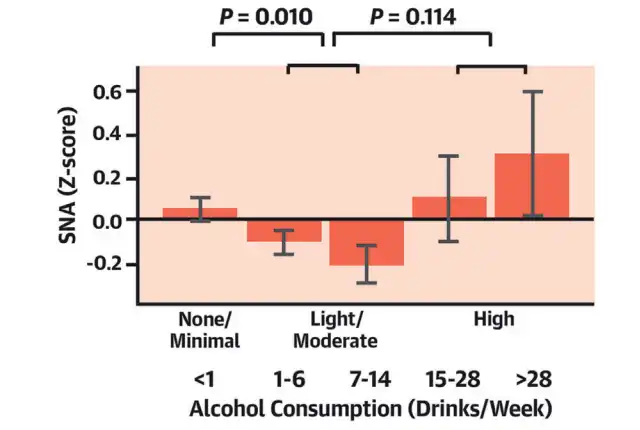
Light-moderate alcohol consumption reduces amygdala stress signals
Mediation analysis indicated that the brain changes in light-to-moderate drinkers explained a significant portion of the protective effect on the heart. This new research suggests that light-to-moderate alcohol consumption has a long-term neurobiological impact on inhibiting amygdala activity.
The researchers explained that when the amygdala is overly alert, the sympathetic nervous system is enhanced, leading to increased blood pressure, heart rate, and the release of inflammatory cells. If stress is chronic, it can result in an elevated risk of hypertension, inflammation, obesity, diabetes, and cardiovascular diseases.
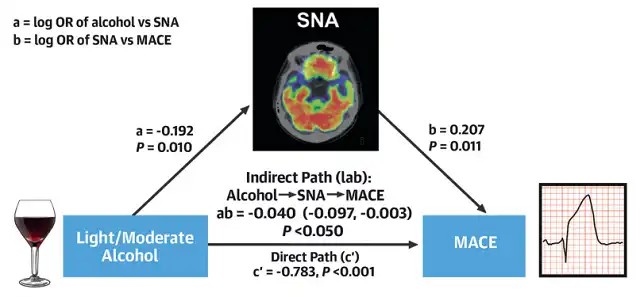
mediation analysis
Finally, the researchers analyzed whether light-to-moderate alcohol consumption would be more effective in reducing heart attacks and strokes in individuals with high stress levels. Among the 53,064 participants, light-to-moderate alcohol consumption reduced the risk of heart attacks and strokes by 40% in individuals with high stress levels and 22% in those with low stress levels, nearly doubling the benefit.
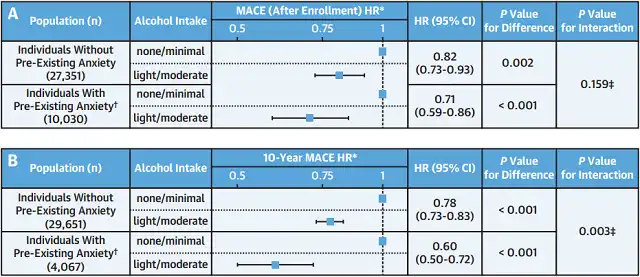
Alcohol consumption and cardiovascular risk in people with and without stress
Despite these findings, the researchers stress that they do not recommend using alcohol to lower the risk of heart attacks or strokes, as multiple studies have shown that any amount of alcohol increases the risk of cancer.
In conclusion, light-to-moderate alcohol consumption is associated with a long-term reduction in stress signals in the brain, which may be a contributing factor to the reduced cardiovascular events observed in moderate drinkers. However, light-to-moderate alcohol consumption increases the risk of cancer, emphasizing the need for new interventions that can positively impact the neurobiology of stress without health hazards.
Harvard Researchers Find Moderate Alcohol Consumption Linked to Reduced Cardiovascular Risk.
(source:internet, reference only)
Disclaimer of medicaltrend.org
Important Note: The information provided is for informational purposes only and should not be considered as medical advice.



